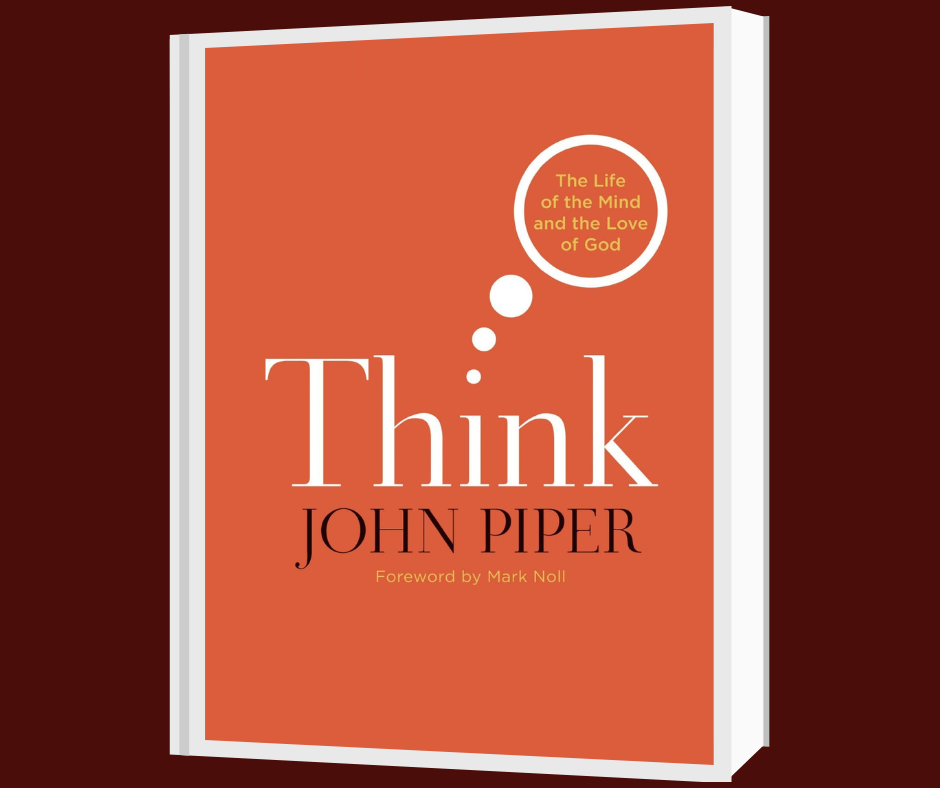Book Reviews
Think, by John Piper | Review by Rosa Byler

Think, by John Piper, is one of a growing number of recent Christian books on the subject of the use of the mind. Controversy between Christians who glorify the development of the intellect and those who intentionally neglect its cultivation is no new thing. Piper credits this tension to “a history of over-intellectualism and anti-intellectualism in the church,” but also to the Bible itself, which celebrates knowledge while making it sound dangerous. A pastor dedicated to the exposition of the Word, Piper sets out to investigate what the Bible means by such paradoxical teaching.
How much of a problem is over-intellectualism among Christians today? Living in a society that increasingly values entertainment above discipline and pleasing self above honoring God, Christians seem more likely to be infected by intellectual slovenliness and neglect of the mind. This book addresses with greater energy what Piper considers the greater need: the anti-intellectual side of the “slippery slope.” However, those who revere thinking and pursue education for its own sake will also come away admonished. What we need is a biblical foundation for God-centered thinking, and Piper addresses the issue in true homiletic style.
(Think is written by a gifted preacher. It reads like a sermon put on paper, which means it does not flow with the easy grace peculiar to the work of a gifted writer. If this is important to you, particularly in a book on the intellect, you will probably experience some frustration in reading it. Persevere! The content is valuable enough to expend some effort digging it out of an unexpected medium.)
After summarizing his own pilgrimage through academia into fulltime preaching ministry, Piper briefly introduces Jonathan Edwards, a significant influence in his own journey. Although this chapter is very short, a picture lingers in the reader’s mind: a man who was not only highly educated and classed as America’s greatest thinker, but also a sound theologian who obviously loved the Lord and demonstrated a disciplined and godly lifestyle.
Piper’s next step is to define “thinking” and to show us its place in coming to faith in Christ. Since our thinking has been warped by sin, how can our minds be of any use in the pursuit of God? Piper focuses his explanation on “reading and thinking,” particularly on the Word of God. An excellent definition of faith follows, including the thought of faith as “a peculiarly receiving grace.” II Cor. 4:4-6 is the basis for six observations on “how human thinking and divine revealing work together in awakening saving faith” (74), after which Piper expounds on loving (“treasuring”) God with all of the mind.
Two chapters cover relativism and why it matters to the discussion. (Relativism states unequivocally that there is no knowable moral standard that is right for everyone; no valid universal definition of truth.) Relativism is in rebellion against the absolutes of God and is an enemy of the right use of the mind. It is self-contradictory, yet attractive to the flesh because it seems to provide a way to do what we want. Piper hopes to “inoculate” Christians against relativism by holding it up to the Scriptures and showing us its effects.
The next several chapters address the problem of anti-intellectualism by examining the Scriptures upon which anti-intellectuals base their position (chiefly, Luke 10:21 and I Cor. 1:20). Piper sets these verses firmly back into their context, where they form essential elements of a complete thought yet prove shaky pillars for anything when considered alone. Several well-known Christian anti-intellectuals of the last several hundred years are recognized, along with some of their legitimate concerns. Piper suggests that these may be based on “perceived antagonisms.” The solution, he says, is not to abandon rigorous thinking, but to embrace “a humble way of knowing,” the title of the next section.
Here Piper investigates the right kind of thinking—thinking that exists “for the love of God and the love of man.” In defense of rigorous and complex thinking, he points out that our society’s infrastructure depends upon it (consider our electrical system!); how dare Christians be any less purposefully serious in our thinking about God and His Word? Piper concludes with specific words of encouragement to both those who love to think and those who do not. Our temptations differ, but the solution for both of us is “to embrace serious thinking as a means of knowing and loving God and people.” (179)
Two minor but potentially sensitive elements surface in the book: the Calvinist position on election is assumed and mentioned in several places, although not in an argumentative way. Arminians will be startled to find themselves categorized with open theists in Piper’s appendix listing current “battlegrounds” and his position on them (also the one taken by Bethlehem College and Seminary, for which institution he includes a rationale.) Before you draw your sword to thrust the book through, consider that Calvinists and Arminians have traditionally painted one another with very broad brushes—and read the footnote, in which Piper makes some qualifying distinctions.
Buy or borrow this book; read it and pass it on. It is a great way to begin thinking Scripturally about thinking!